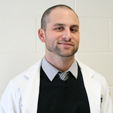Gregory Botta

Medicine, Molecular & Cellular Biology and Genetics/Biomedical Engineering MD, 2013; PhD, 2011
As both a physician and scientist in training for a career in Academic Medicine, it is of the utmost importance to be able to conceive, write, and successfully obtain grants in an effort to show independence as an investigator. One such source is the NIH Ruth L. Kirschstein National Research Service Awards (F-30) for Dual-Degree Fellows. Aside from Dr. Kirschstein’s scientific accomplishments in polio vaccine development, and becoming the first woman director of an NIH Institute, she was a champion of research training and a strong advocate for the inclusion of underrepresented individuals in the scientific workforce. The National Grants named in her honor allow young-investigators to gain independence in their career development within a highly mentored environment working on a novel project.
Each NIH Institute and Center (IC) has a unique scientific purview and different program goals and initiatives that evolve over time. I was very fortunate to be sponsored by and funded through the National Institute of Diabetes, Digestive, and Kidney Diseases over the course of my MD/PhD training. In December of 2011 I completed my PhD thesis on the constitutive activation of K-Ras mutated pancreatic cells and the signaling pathways associated with their metastasis.
Since then, I have been fortunate enough to secure a small post-doctoral opportunity at the University of Pennsylvania Perelman School of Medicine in the Gastroenterology Department under the mentorship of Dr. Anil Rustgi. Dr. Rustgi is a leader in the field of digestive carcinogenesis and we have developed a project which centers on induced pluripotent stem cell incorporation of specific transcription factors found unregulated in embryogenesis, pancreatitis, and pancreatic carcinogenesis.
These domestic opportunities, coupled with my international experiences as a selected young researcher at the 61st Lindau Nobel Laureates Meeting in Physiology & Medicine, as a scholarship recipient to the Karolinska Institutet in Stockholm, and selected speaker at the FEBS conference in Spetses, Greece, have underscored my desire to direct my career into academic medicine and matured my scientific, professional, and personal outlook and goals.
It is my hope to not only elucidate new mechanisms in pancreatic diseases, but to honor the NIH, NIDDK, Drexel University, and the University of Pennsylvania in my academic demeanor and professional development.